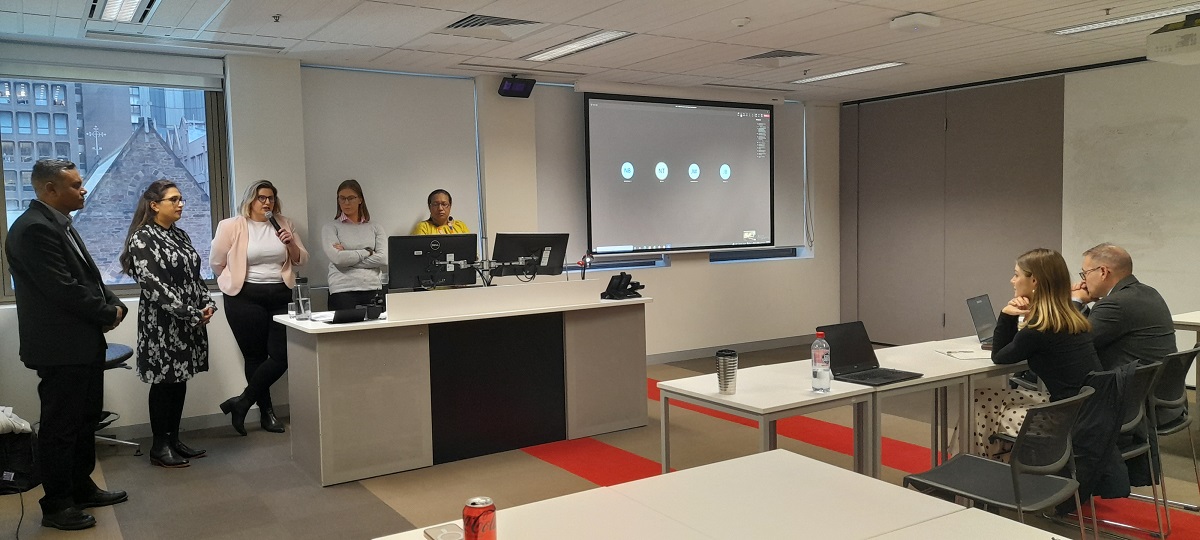
A team of MBA students at Flinders University have worked towards a solution to a problem faced by industries around the world, as they develop and build an innovative talent base within the public sector. The team, code named Trim Solutions, came up with the solution as part of Flinders University’s Defence Entrepreneurship Program, part of the Hacking for National Security program, which is delivered in study period 2 (Jul-Sep).
As part of the program, Trim Solutions worked to define what motivates the modern workforce in order to define a product for attracting, retaining and empowering talent through four key functions aimed at improving existing compensation packages:
- flexible working arrangements,
- mentorship programs,
- private health insurance options, and
- home ownership assistance.
Problem sponsors, the Joint Command, Control, Communications and Computer Systems (JC4S), a department of the Defence Science and Technology Group (DST), gave the team manpower and staffing challenges to address, and tasked the team with developing methods of attracting and retaining the workforce it will require to deliver future defence capability requirements.
The team, made up of five MBA students – Ishvindera Kaur Bhamra, Isabella Stocco Bradley, Neresh Briglal, Hannah McArdle and Maureen Neilson – spent 11 weeks building a solid understanding of the problem, talking to relevant parties, and developing a proposed solution. After their investigation, the team were able to identify that the problem facing JC4S had three primary components: attraction, retention, and future capability building.
As part of their effort, the team conducted over 72 interviews with active defence staff and other stakeholders and received 46 survey responses from engineering students to direct their thinking. At a final class presentation on 16 September, team members showcased their knowledge and understanding of a problem set, offered substantial research evidence that guided their decision-making process, and delivered their tailored, unique solution that addresses long-term needs.
Seeking a long-term strategy, their minimum viable product is an improved compensation package. Pursuing a broad and long-term strategy that addresses the reasons some professionals may not pursue careers within the Defence sector, Trim Solutions addressed quality of life concerns, along with opportunity for growth and career advancement.
Flinders University MBA Director and Topic Coordinator of the program Carla Dias Wadewitz praised the dedication of the students at the close of the presentation.
“This is a deep dive on the problem trying to understand the root causes and the why’s of the problem, and you have done that through a lot of hard work. I am proud to see that you have also developed an MVP for a possible solution after intensive market research,” says Carla.
A global movement
Hacking for National Security is Australia’s version of a global course started at Stanford University in the US six years ago as Hacking for Defence – a way to engage university students who may never have previously considered working on national security problems. The class is now coordinated through The Common Mission Project, the non-profit partner of innovation company BMNT Inc. It’s taught at more than 60 universities in the US and the UK, while in Australia, Hacking for National Security is taught at Flinders, University of Southern Queensland and the University of New South Wales, and is supported by the Defence Next Generation Technologies Fund.
Building a solid base of entrepreneurial talent is the primary reason the “Hacking 4” coursework began, to bridge innovators and problem sponsors and help solve critical national security problems.
The Flinders students’ initial problem set is the tip of the iceberg in a larger effort to engage talented students with the military and the public sector, and highlights precisely the broader mission of Common Mission Project and H4NS to connect students with the Australian Department of Defence .
Team member Stocco Bradly highlighted the challenge for both the problem sponsor and the military in general.
“There is a small section of people who are really passionate about working in the public service. I’m one of them. … But that’s not everybody,” says Stocco.
The course teaches students how to use modern entrepreneurial tools and processes to solve touch problems at speed. Among these are the Lean Startup methodology focusing on beneficiary discovery and validation, problem curation process and the Mission Model Canvas, a variation on the Business Model Canvas used by new ventures to guide the process of building a successful business model.
Talking about the team’s progress, team member Briglal praised the opportunity to develop skills and knowledge in previously unknown concepts.
“The Mission Model Canvas was a new concept for all of us in the team, and we needed to put that into a more defined method for the defence sector. We learned through helpful conversations with our teachers and CMP that everything on the Mission Model Canvas is really a hypothesis and so we just started on a journey to learn,” says Briglal.
This project undertaken by Flinders MBA students is yet another example of how the H4NS program allows students to get a better understanding of the Australian Defence industry whilst inspiring them to positively contribute to the development of the future Defence capability requirements.
To know more about the Defence Entrepreneurship Program (part of H4NS) offered at Flinders University MBA read more here: https://www.flinders.edu.au/content/dam/documents/colleges/bgl/DEP.pdf

